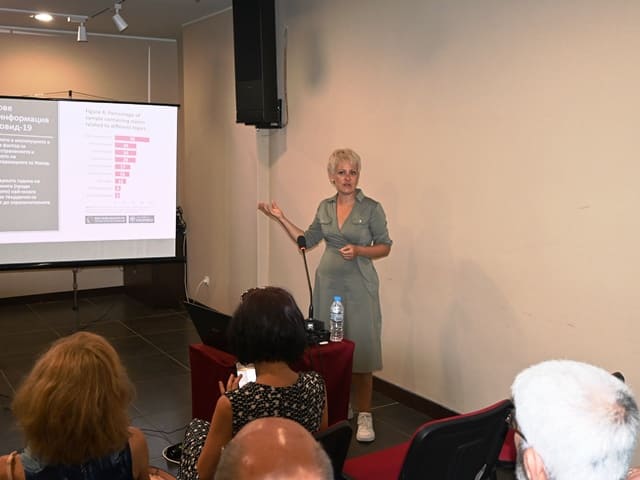On July 8, 2022, in the afternoon, a second debate was held in Pleven, organized by the "Modern Pleven Media" Foundation under the project "To manage the COVID crisis with care, reason, values, unity, solidarity".
His topic was "How to recognize and deal with fake news". The leader of the debate was Ralitsa Kovacheva - journalist, editor-in-chief of factcheck.bg, lecturer at the Faculty of Journalism and Mass Communication of the University of St. Kliment Ohridski". Ms. Kovacheva has worked in radio stations, television and online media, and currently teaches international journalism and television practice.
Naturally, the audience was dominated by journalists and public relations specialists, but there were representatives of the non-governmental sector, students, active citizens. In the audience were also six students from the editorial board of the newspaper of "Ivan Vazov" school "V@z, buki, vedi", led by their teacher, who were very active in asking questions.
Ralitsa Kovacheva presented extremely rich material in her presentation entitled "Disinformation about Covid-19". What is the definition of disinformation, what is the difference between disinformation and propaganda, why does disinformation about Covid-19 work so well and how does one explain the phenomenon in our country of the pandemic itself having less fake news than about vaccination. Ralitsa Kovacheva showed specific titles, publications and video on the topic. The prepared presentation included interesting research from Reuters.
Here's how the answers to the question of why the disinformation about Covid-19 works so well sum up:
– Novelty (no old knowledge and personal experience);
– Fear (strong emotional impact);
– Health (strong customization);
– Contradictory information (cognitive dissonance, denial of science);
– Political polarization (ideological bias as a factor in the attitude towards the topic).
Trust in institutions is a key factor in the spread and impact of misinformation about Covid-19. The participants in the debate were united around this conclusion.
Attendees expressed opinions, shared personal experiences and observations, and asked many questions. What was shared provided food for thought and the debates truly became the "Lessons of the Crisis" as their title suggests.
At the end of the summer, there will be another debate on the project - about lessons in health care and medical science.
